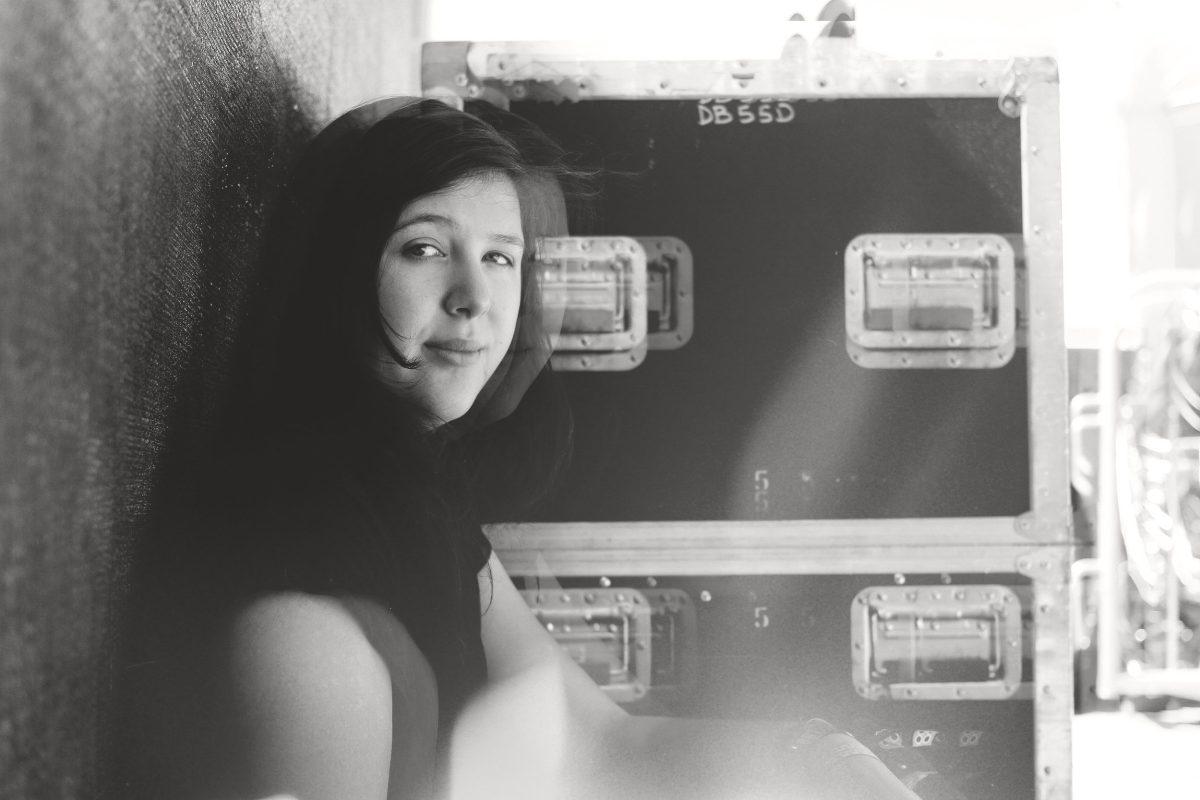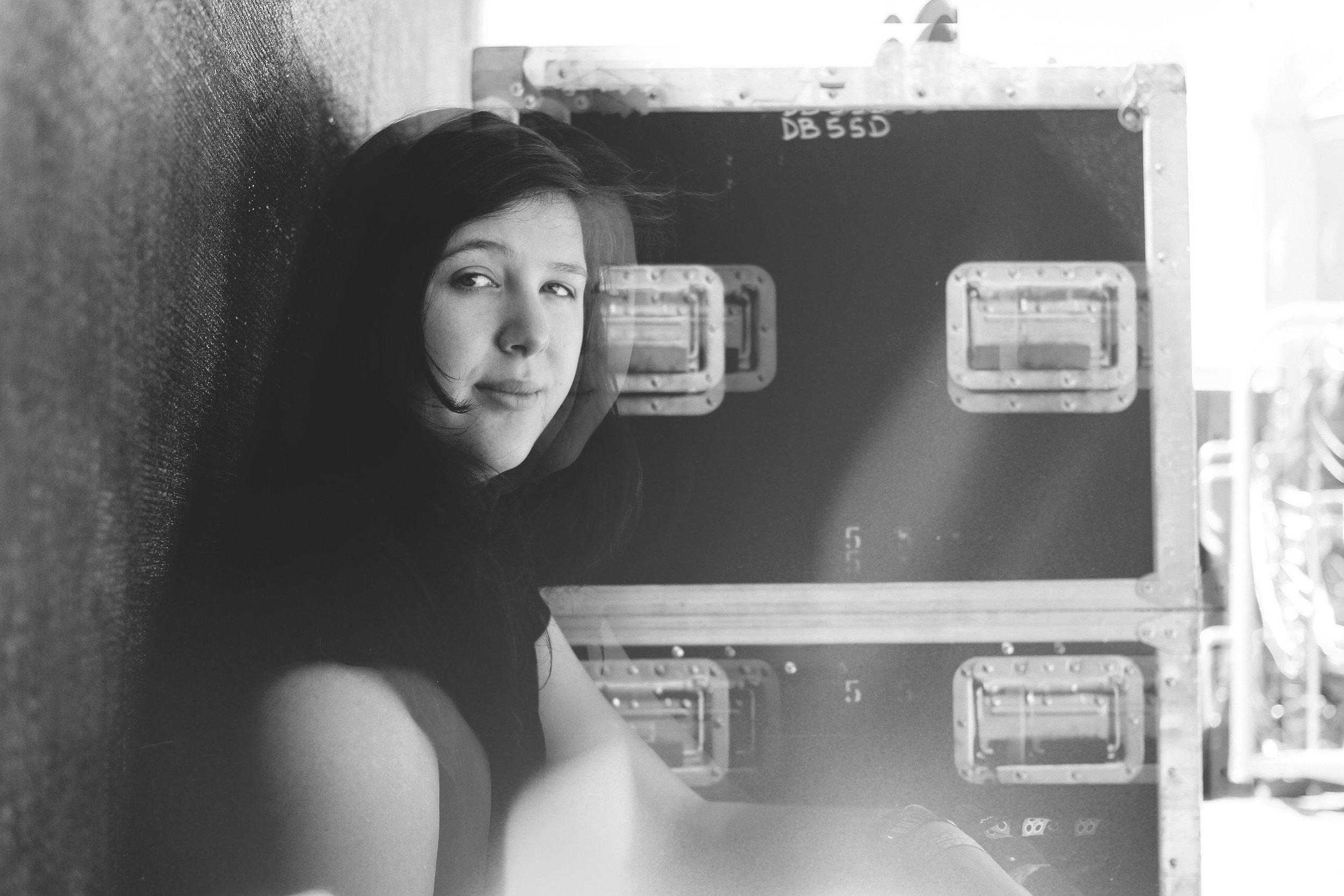
exc-57f6ac2120099e032f7be0cc
Lucy Dacus by Jesus Acosta.
When Lucy Dacus dropped out of film school, she figured she might as well record an album. She was convinced by her now-guitar player Jacob Blizzard, who needed to turn in a music project for school.
Story by Rachel Rascoe
Photo by Jesus Acosta
Since then, Dacus’ debut record “No Burden” has been heard by more than her band-mate’s professors, and was recently reissued on Matador Records.
The Richmond-based singer’s Southern-infused pop tells tales of growing up, brought into retrospective maturity by her soulful vocals. The album looks back on middle school and emerging youthful femininity, singing on the second track “Troublemaker Doppelgänger,” “she grew up as the pretty young thing / Let them look up her skirt on the backyard swing…. I can understand how a girl gets bored / Too old to play and too young to mess around.”
After leaving Virginia Commonwealth University, Dacus worked a 9 to 5 job at a photography lab, where she “actually really loved it”. She spent her time listening to music and podcasts while editing yearbook pictures. The singer-songwriter also took a trip to Europe during her break between school and the release of her album, where she found “this unified opinion that American academia is a total joke.”
The 21-year-old will return to Europe this fall to go on tour with her band. ORANGE sat down with Dacus at Austin City Limits, the day after her festival performance.
When did you first start writing music?
Guitar came in like seventh grade because I went to a church camp and our bunk leader could play guitar, and I thought she was basically the shit. I was like, ‘I want to be cool and play guitar like that person.’ I just got one off eBay for $100 and looked up chords on the computer.
Now I play in a different tuning than standard, and I don’t really know chords. I haven’t really learned music theory. It’s not a strong suit.
When you were doing solo stuff early on, were there any artists that you tried to embody?
The only person that I can directly say that I know influenced me was Shakey Graves, and we’re in Austin so I guess everyone loves Shakey Graves here.
I think he influenced me just because he’s solo and was doing the one man band thing, and I didn’t have a band. He also plays in the alternate tuning that I play in, so I just devoured all of his YouTube videos and watched what chord shapes he was making. His songwriting is super rich, like the lyrics are super good. The storytelling is awesome.
In “I Don’t Want To Be Funny Anymore,” it seems like you’re talking about stepping from one role into another. What roles were you looking to move away from?
I guess I was pegged as being the tall and funny one. I was in a group of girls in middle school and we were like two years ahead in math and everyone was so prideful about that. They were all kind of the cute-straight hair,-first girls to wear makeup kind of thing, and I was allowed in the group because I was funny, basically. They needed a quirky counterpart.
It’s constraining, to think about your identity in those terms.
Do you have any specific experiences that inspired “Troublemaker Doppelgänger”’s insights on the female experience of growing up?
You don’t know how you’re growing up until you’ve grown up. You can only really judge what happened to you once you have an adult frame of mind to look back on your childhood. Seeing other people and women who grew up differently than me, and seeing a common thread, specifically for “Troublemaker Doppelgänger,” is that beautiful women sometimes get raised where exceptions are made for them.
Just, trying to figure out like why do adults do that to young girls. There’s this weird Southern mentality with gender separation, just adults telling girls at a certain age you’ve become an object. You’ve got to be careful. The way you look matters. You want to be attractive, but you don’t want to get involved with anybody when you’re too young. It’s really confusing how people raise girls.
How do you think being in film school influenced you musically?
When I was in school, I would find myself writing songs as an impulse and fulfilling assignments as assignments. There was a lot of stress attached to doing my actual work, but there was no stress in writing music. When I left film school, it solidified this idea thatwriting music comes naturally, and I should probably spend more time cultivating that.
The whole music thing happened unintentionally until I realized it could happen. And once I was like, ‘Oh, this is possible,’ we kind of focused our energy into that. I didn’t think it was possible for a really long time.
Do you still like working with film and photography?
It’s weird. I still like that stuff, but there’s this hesitancy to interrupt a moment to bring out a camera, because when you bring out a camera, it changes the moment. I haven’t really reconciled what to do because I want remember all this stuff that’s happening, but I also don’t want to be the one to separate myself from what’s happening in the moment.
Are you working on any new music?
I want to record as soon as possible. I’m excited about the next album because all the songs were written knowing that there would be a band, and all the songs off “No Burden” were written solo, and we just made up the band parts. I can see myself writing with drums in mind, or like, ‘Oh that’d be a cool bass part,’ so I think it’s going to be a little more intentional.
Maybe we’re going to embrace the more rockin’ parts of the music that we make. I like it when lyrics and sounds match, like when production value matches the intent of the words. So hopefully that will happen.
